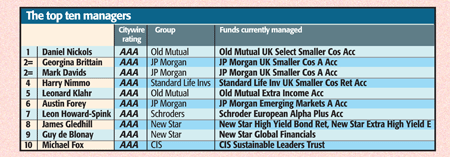
Given the overwhelming response to Anthony Bolton’s exit from Fidelity, you’d think a manager was the only thing to worry about when choosing a fund. Certainly, some managers – a very select minority – have proved consistent outperformers. Citywire.co.uk has a comprehensive breakdown of all UK fund managers’ performances. Managers with an A or AA rating are better than average, while those with an AAA rating are in the top 5% of all UK fund managers. The rating is calculated according to the amount of risk a manager takes on and their performance against their own benchmark over a three-year period.
Choosing an investment fund: the top ten managers
But it’s not just about past performance, which, as fund groups always warn us, is no guide to the future. A study by David Finstad, published in the Canadian Investment Review in 2005, found there are four things investors should look for: ownership, low staff turnover, diversification and a bottom-up approach to investing. Finstad suggests investors should buy into small, boutique investment firms rather than larger ones. A fund manager in a boutique is more likely to have some ownership stake in the firm, and thus more incentive to outperform. Fund managers with a share in the business are also less easily poached by rivals, meaning the fund will benefit from more stability. Boutiques also tend to be less diversified than larger rivals, who prefer to minimise risk, which can hit returns. And a bottom-up stock-picking approach rewards genuinely active managers who make bold choices, rather than those who hug their benchmark index.
But remember that no matter how good a manager is, they’ll have a tough time delivering decent overall returns if their favoured sector is performing poorly. You should be wary of funds being promoted on the back of strong recent returns – last year’s winners often turn out to be this year’s losers. For example, in recent years commercial property funds are being pushed in the wake of huge private-investor interest, yet even the most bullish forecasters reckon the sector is set to slow. Fees also make a big difference. The underlying performance of unit trusts and investment trusts over time is similar, but when charges are taken into account investment trusts win, because their fees are usually about a third of those charged by unit trusts. Tracker funds and exchange-traded funds are even cheaper, because there is no need to pay an expensive fund manager. And given that most managers fail to beat their benchmark, we’d suggest that it’s this last factor – cost – that should be your biggest concern when choosing a fund.